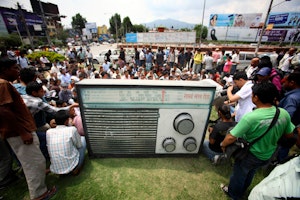Can Malaysia’s Leading Independent News Site Survive a Censorship Law?
By Shuwei Fang
On April 13, journalists in Malaysia had their fears confirmed when the country’s parliament approved amendments to its sedition law, giving the government broad new powers to censor media online. The changes extend the maximum jail term from three years to twenty, and make it illegal to propagate sedition on the internet—the definition of which, complain opposition lawmakers, remains wide open to abuse by the government.
“The strengthening of Malaysia’s already draconian Sedition Act shows how desperate Prime Minister Najib Razak has become to silence media criticism of his government,” said Shawn Crispin, senior Southeast Asia representative of the Committee to Protect Journalists.
Although print and broadcast media have long been heavily censored in Malaysia, the country’s news websites had always been left relatively untouched. Online media is big business in Malaysia, thanks to government investment during the 1990s in the Multimedia Super Corridor, an East Asian version of Silicon Valley.
The Malaysiakini group (Malaysiakini.com, KiniTV.com, and KiniBiz.com) is one result of that boom. Founded in 1999, it now hosts Malaysia’s leading independent news website in English, Malay, Chinese, and Tamil, and has a reputation for regularly covering subjects and viewpoints—including voices critical of the government—deemed taboo by the mainstream broadcast and print media.
But what really makes Malaysiakini extraordinary is that, despite a highly politicized and challenging business environment, it manages to turn a profit.
How does it do it? Chia Ting Ting is head of advertising and digital marketing at the Malaysiakini group. Until 2014, she was also chief of the women’s wing of Barisan Nasional, the ruling political party, in the state of Selangor Gerakan; as such, she is familiar with the culture of power in Malaysia. Ting Ting said the new amendments to the Sedition Act will have “a mixed impact.”
“On one hand, it is no longer an offense to criticize the government or the judiciary,” she said. “On the other hand, it widens the scope on speech against race, religion, and royalty—the ‘three Rs’—and makes the punishment more severe. As Malaysia has race- and religion-based laws, and the royals play a major role in politics, it will now be more difficult to question these aspects of society.”
Ting Ting said the new amendments to the law have not yet been used, and that “Malaysiakini will continue to report without fear or favor, reporting matters of public interest.”
Confident that it will be able to maintain its independent voice, Ting Ting identified five factors that allowed Malaysiakini to transform from a subscription- and grant-based revenue model to a profitable business venture that receives two-thirds of its income from advertising.
1. It strikes a balance between being mission-driven and profit-driven.
These competing purposes can coexist in a media company as long as they are kept separate and transparent. Journalists and salespeople have different management structures, reward systems, and compensation.
2. It doesn’t focus just on advertising.
Malaysiakini uses the creative minds at its disposal to make sure that advertisements are relevant, targeted, and creative. Its website design is flexible so that audiences don’t suffer from “ad blindness.” And it provides a premium service to clients who spend the most. Malaysiakini earns less than 10 percent of its advertising revenue from ad networks. Instead it relies on its premium advertising strategies.
3. It went native.
Native advertising is controversial, but this is the direction that online media are going, and around 20 percent of Malaysiakini’s site is sponsored content. Ting Ting believes that independent media can maintain their credibility by keeping the ratio of native advertising low, and making sure it’s distinct and clearly identified so that readers don’t think they’re being tricked.
4. It builds alliances.
For 58 years, Malaysia has been ruled by the same party. For this reason, Government Linked Companies (GLCs) like Petronas and Malaysia Airlines are the biggest spenders when it comes to advertising. By identifying sympathetic individuals in these companies—progressives, in particular—Malaysiakini is able to build trust with them and tailor creative solutions to their needs.
5. It educates advertisers.
Since many advertisers aren’t aware of all the possibilities of digital advertising, Malaysiakini educates them. It produces comprehensive rate cards and media kits to fully introduce its site and its audience. One of its most important messages is that digital advertising is not a blind push. It’s about being able to target specific audiences, and unlike print advertising, it is easily measured.
Shuwei Fang is associate director for Programs at the Open Society Foundations.


